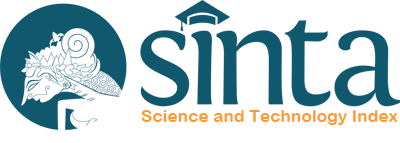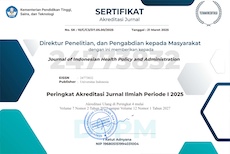Abstract
Teleconsultation is a form of telemedicine that has developed rapidly during the COVID-19 pandemic. Clinical teleconsultation provides remote clinical consultation services to assist in establishing a diagnosis, and/or providing treatment considerations/advice. There are several issues in telemedicine, including ethical and legal issues. This study aims to find ethical and legal issues related to teleconsultation services after the COVID-19 pandemic. This research uses normative legal research methods. The laws and regulations that are reviewed by the researcher are those that are still valid in the Republic of Indonesia until June 2022. Researchers compare teleconsultation regulations and laws that were in effect during the pre-pandemic COVID-19 period with those that were in effect during the pandemic. Moreover, researchers examine ethical and legal issues that will arise during the COVID-19 endemic period. In conclusion, if the regulations during the pre-pandemic period are reimplemented during the endemic period, ethical and legal issues will arise. The issues vary from teleconsultation can only be provided by medical facilities like hospitals instead of direct consultation between doctor and patients. Furthermore, the applications must be legally issued and registered by the government, particularly from the ministry of health. Diagnosis enforcement does not follow professional standards in terms of physical examinations is also an issue. Besides, there are more issues such as electronic prescription is not allowed and doctors must be able to prove that there are no intentional factors in the cases of patients’ data leakage and medical record hacking. In this way, the government is expected to make basic changes in the existing teleconsultation laws and regulations or to make specific teleconsultation laws and regulations with the purpose of providing legal protections for doctors.
Bahasa Abstract
Telekonsultasi merupakan salah satu bentuk telemedicine yang berkembang pesat selama masa pandemi COVID-19. Telekonsultasi klinis memberikan pelayanan konsultasi klinis jarak jauh untuk membantu menegakkan diagnosis, dan/atau memberikan pertimbangan/saran tata laksana. Terdapat beberapa isu yang menjadi persoalan telemedicine, termasuk masalah etik dan legalitas. Penelitian ini bertujuan untuk menemukan isu etik dan legal terkait layanan telekonsultasi pasca pandemi COVID-19. Penelitian ini menggunakan metode penelitian hukum normatif. Peneliti mengkaji peraturan dan perundang-undangan terkait telekonsultasi yang masih berlaku di Republik Indonesia hingga bulan Juni 2022. Peneliti melakukan perbandingan antara peraturan dan perundangan-undangan terkait telekonsultasi yang berlaku pada masa pre pandemi COVID-19 dengan yang berlaku pada masa pandemi. Kemudian peneliti mengkaji isu etik dan legal yang akan timbul pada masa endemi COVID-19. Pada kesimpulan, jika peraturan pada masa pre pandemi kembali berlaku di masa endemi, maka akan timbul isu etik dan legal , yaitu telekonsultasi hanya dapat diberikan oleh fasyankes berupa RS, telekonsultasi tidak boleh langsung antara dokter-pasien, aplikasi yang digunakan harus dari pemerintah/terdaftar di kementerian kesehatan, penegakan diagnosa menjadi tidak sesuai standar profesi dalam hal pemeriksaan fisik, tidak boleh melakukan peresepan elektronik secara terbuka, dan dokter harus dapat membuktikan tidak ada unsur kesengajaan pada kasus kebocoran data pasien dan peretasan rekam medis elektronik. Pemerintah perlu melakukan perubahan dasar hukum telekonsultasi yang sudah ada atau membuat peraturan perundang-undangan kekhususan telekonsultasi agar dokter memiliki perlindungan hukum.
Recommended Citation
Fitriana, Mila and Achadi, Anhari
(2022)
"ANALYSIS OF THE NEED FOR LEGAL PROTECTION FOR DOCTORS IN TELECONSULTATION SERVICES TOWARDS THE COVID-19 ENDEMIC IN INDONESIA,"
Journal of Indonesian Health Policy and Administration: Vol. 7:
No.
3, Article 1.
DOI: 10.7454/ihpa.v7i3.6013
Available at:
https://scholarhub.ui.ac.id/ihpa/vol7/iss3/1
Included in
Health Policy Commons, Health Services Administration Commons, Health Services Research Commons




